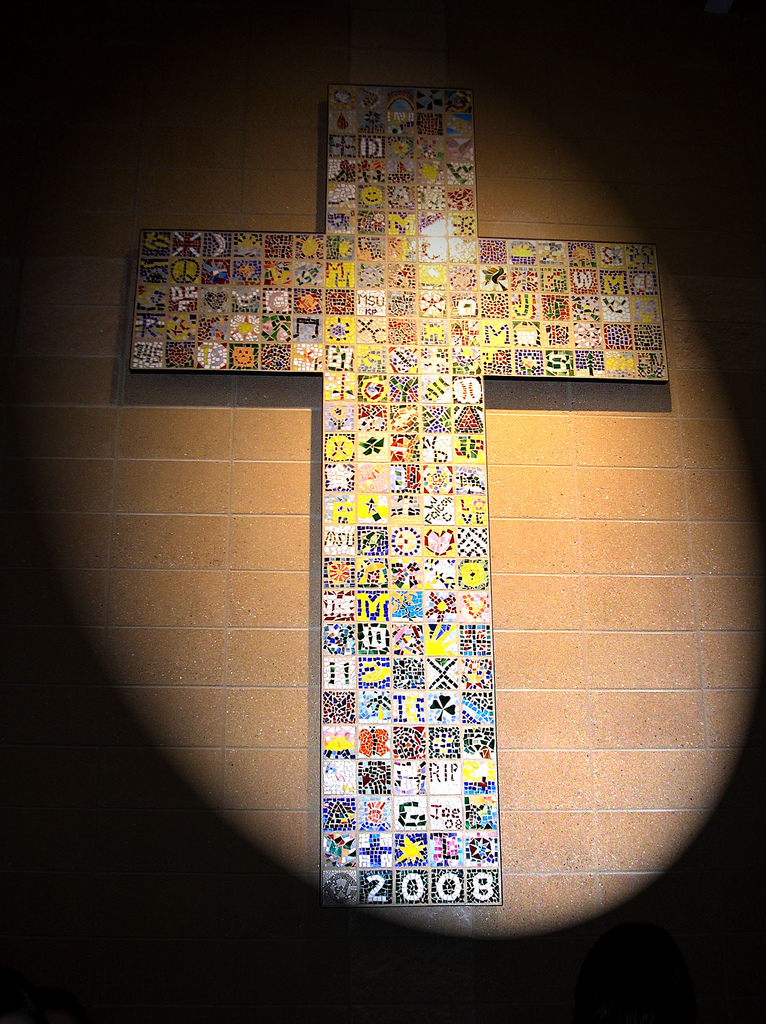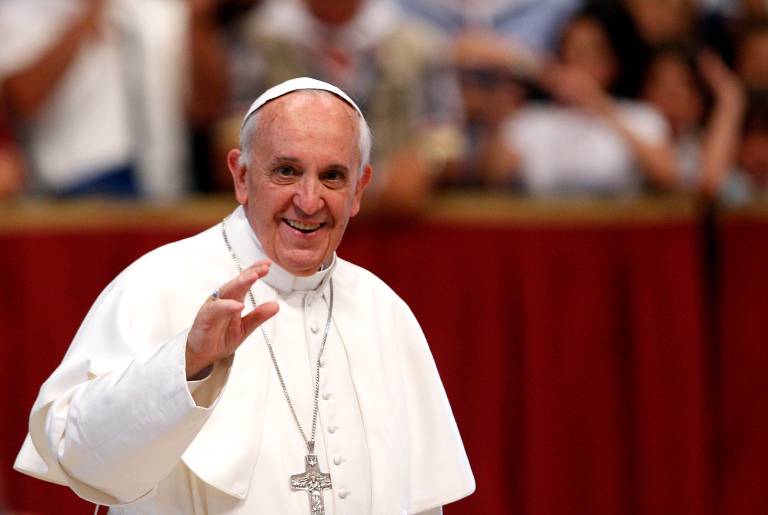In anticipation of this Friday’s opening of the final Harry Potter film, I’ve just re-watched the seventh film, Harry Potter and the Deathly Hallows, Part 1. It reminded me, yet again, why I love this series and why I think it is an incredibly important resource for those of us who are interested in forming people in the attitudes, actions, and virtues crucial to the Christian life.
The “deathly hallows” which give this book its name are three objects associated with a story about three brothers who encounter Death while traveling. They have just used their magical skills to make a bridge and cross safely, thus cheating Death. Death appears, angry, but pretends to congratulate them and offers them any prize they choose. The first brother asks for a wand so powerful he can defeat any enemy; Death grants it, and the brother goes off and kills his enemy, boasts of his wand, and has his throat slit in his sleep. Death wins. The second brother asks for the ability to raise the dead; Death grants it, and the brother raises the woman he once loved, but she was only partly there, and didn’t truly belong, and couldn’t really be with him. He killed himself so as to be with her truly, and Death had him as well. The third brother, called humble and wise in the story, asked for something that would allow him to leave without being followed by Death. Death was forced to hand over his own invisibility cloak. Death never found him until, as an old man, he handed the cloak over to his son. When Death came for him, this brother greeted him like an old friend, and happily departed with him.
The “deathly hallows” are the wand, the stone, and the cloak. But the story is much more important than a story about the origins of these objects with their own contributions to the story. Rather, the story suggests three very different attitudes toward death. Each of them attempts to master or best death, but they do it in very different ways. The first brother seeks to use Death’s power to deal death to others. Although he does that, he cannot escape death himself. The second brother seeks to avoid Death’s hold over his loved ones. He succeeds, sort of. To steal a line from another book in this series, he can only manage “a half-life, a cursed life” a life not really worth living. The only way to defeat death is to take the third brother’s way: to avoid death while you can, but also to refuse to cling to life at all costs, to know when it is your time, to accept that dying is a part of living, to depart this life in a way that gives life to others.
Throughout the series, Voldemort (whose name vol de mort is literally “flight from death”) takes both of the first two paths liberally. He kills regularly for the sake of power. And he clings to whatever half-life he can manage through his horcruxes and other dark magic. And so, this story, told to Harry about halfway through the 7th book (and near the end of the 7th film), holds out to him a simple choice: try to defeat Voldemort (and death) in the ways Voldemort himself has done, or take the third brother’s way.
There have been, of course, all sorts of little hints that this is what will be asked of Harry—not least of which has been that the story of his mother’s self-sacrifice for him has loomed large throughout the series. But there are also plenty of hints that Harry will take another path. How could the boy who has so longed for the parents he lost as an infant not call them back to him if he had the Resurrection Stone? Wouldn’t he call back Cedric and Sirius and Dumbledore? And hasn’t he trained all his life as a wizard to develop the magical skills to finally kill Voldemort? The first two paths are wide open to him as well.
This is the real drama going into the 8th film. It is not simply whether Harry has the skills and tools that he needs to defeat Voldemort; rather, the key question is whether he has been adequately trained in the virtues that would allow him to take the third path, or (to make the connection explicit), to lay down his life for his friends. Dumbledore has tried to form Harry in precisely this way. He told and retold the story of Harry’s mother’s sacrifice; he helped Harry nurture friendships; he even spent time helping him to love his enemy (come on, what was book/movie #6 except a long lesson in coming to see Voldemort as the human, vulnerable Tom Riddle towards whom Harry should have more compassion than hatred?). Dumbledore also told Harry so many times that the most powerful thing that he has–that Voldemort does not–is love.
I won’t give away the ending here, but I will say this. I think Harry’s drama is the drama of every baptized Christian. We are marked (most of us in infancy) by a gift of self-sacrificial love that makes abundant life possible for us, that makes us who we are, and that makes love possible for us. How do we become people who, like Harry, take responsibility for fighting evil and protecting the common good? How do we fight evil without becoming evil? How do we become—like so many Christians before us—people capable of laying down our lives for others whether in service or in the sacrifice of martyrdom? Moviegoers will see what Harry has become capable of on or after Friday.
The series has already inspired a generation of young adults to social activism. I wonder if it could not also be a resource for formation in virtue more broadly, and even of a better understanding of a deeply Christian understanding of (and relationship with) death. I wonder if Harry Potter could actually help Christians understand that at the very heart of our faith is the proclamation of a love that is stronger than death.




I had not made a baptism/mark connection before, but I like that quite a bit. I do think HP is one of the stories of our age (like the Chronicles of Narnia and the Lord of the Rings before him) that has the potential to captivate us in good ways and make us re-imagine what our Muggle world looks like. Another one I’m thinking about is the importance of friendship here – and that despite the titles, it’s never only “Harry Potter and the ___________”.
How can it be said that love is stronger than death in HP? Harry presumably died at some point. Death is still the end of every person in the HP world. Love is not literally stronger than death. Where does that leave us, with the redefinition of that Christian notion the same way Hermione redefines the Christian notion that “the last enemy to be defeated is death”?
Death is defeated not by resurrection in HP, but by “living after death”. Why does nobody see that HP redefines Christian hope?
For a different take: try http://viralcatholic.com/dumbledore-in-the-garden
Brian, thanks for your comment and the link to your post. Although Harry “lays down his life for his friends,” he doesn’t exactly die and he certainly isn’t resurrected in the sense that Jesus is. I agree with you that the arrangement between Dumbledore and Snape is morally problematic. I also agree that the line “to the well-organized mind, death is but the next great adventure” makes it all sound far too easy. But remember, that is said by Dumbledore to an 11 year old Harry, a Harry already being formed to see death not as a good, but as far from the worst thing that can happen to someone. Obviously the series never gets explicitly religious, but I read this world, in which there are Christmas and Easter holidays and scriptural quotes on tombstones, as one in which Christ has lived, died, and risen. Christian hope remains defined by that. Harry (like his mother) just displays something of what it means to love strongly enough not to rush into death needlessly nor happily, but to do so willingly if that is what love requires.